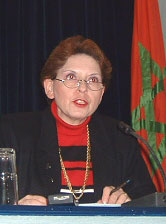Towards Public Broadcasting in Morocco and the Region — A regional conference on public broadcasting Magreb Arab Press Agency, Rabat, Morocco, December 16-17, 2003
Lebanon’s Broadcast Industry: A Work in Progress
— by Magda Abu-Fadil

Abu-Fadil
Ladies and gentlemen,
I’d like to extend a special thanks to the International Federation of Journalists and the Syndicat National de la Presse Marocaine for including me in this conference. This is my first visit to Morocco and when I received the invitation, I jumped at the opportunity to come and become acquainted with this great country’s heritage and its media scene.
History:
To understand Lebanon’s media laws and policies, one must take the historical context in which they evolved into account — from 1943, when the country moved to full independence and ceased being governed under the 1920 League of Nations mandate given to France, to the end of the country’s Civil War in 1990.
The media policy environment is a reflection of efforts to recover from the civil war, compounded by the geopolitical complexities of Lebanon in its relationship to Syria, the rest of the Middle East, and ever-present threats from Israel.
The Civil War totally altered the landscape of television broadcasting as well. By the end of the Civil War, between 40 and 50 unlicensed television stations were, or had been, broadcasting to portions of Lebanon.
The new media laws have limited the number of media with licenses to publish news and the licenses that have been allocated were awarded, at least in part, to the political interests that dominate the confessional system of government.
There are multiple layers of censorship that persist beyond the control that Syria exercises over Lebanese affairs and limitations on free speech found in the Penal Code, the Press Law and the 1984 Audio-Visual Media Law. There is self-censorship, for example, and media have been punished with ads or commercials pulled from offending stations or papers for non-compliance with political guidelines.
Broadcast Media Law:
The 1994 Audio-Visual Media Law ended the state’s theoretical monopoly over electronic broadcasting and made Lebanon the first country in the Middle East to establish a regulatory system for permitting private radio and television broadcasting to be both produced and distributed within its borders.
And, as with the Press Law governing the print media, the 1994 Audio-Visual Media Law distinguished between Category 1 licenses, which allowed for the broadcast of news and political programs, and Category 2 licenses for television stations that did not intend to broadcast news. Different licensing fees were to be charged for each category.
Although the Audio-Visual Media Law provides that only TV stations with Category 1 licenses can broadcast news, the government made an exception for Hizbullah's Al-Manar and the Catholic Church's Télé-Lumière. Al-Manar was allowed to continue to broadcast news after September 18, 1996, if it limited its domestic news coverage to information about the resistance in southern Lebanon. Télé-Lumière, which does not broadcast news but had no license whatsoever, not even a Category 2 license, was allowed to remain on the air in order to balance Al-Manar, which is perceived as a Muslim station.
While the 1994 Audio-Visual Media Law requires that the private stations must have shareholders from all religious communities in Lebanon, in practice the stations tend to be identified with a specific religious or ethnic group.
What’s Missing:
One aspect that is sadly neglected by employers in Lebanon, however, is the need for professional training, codes of conduct or guidelines for good journalistic practice and ethics and self-regulation.
We in the Arab World seem to think that we know everything. We don’t accept criticism and are often resistant to suggestions that we can learn new things.
That’s wrong. We should first accept that we have limitations, that we CAN learn new things, and that we have some serious catching up to do with the rest of the world.
We urgently need to follow courses on business journalism, we need better environmental and scientific coverage, we need training in newsroom management, and, very importantly, we need to focus on online journalism.
Fewer people are reading newspapers. Young people are switching off many TV stations — except for music videos and the like — but everyone seems to be browsing the Internet at home, at the office, at cafes and on their cellular phones or hand-held devices. Even rural areas are getting mobile Internet access.
But how many people can actually write for a news website, edit content, design with graphics, or know the language of HTML? It’s not the future, it’s now.
We’re also being faced in Lebanon, the Arab World and beyond with media convergence. Reporters and correspondents are being asked to do standups in front of TV or Web cameras, write for newspapers, provide material for websites and do radio pieces, all within the same news organization.
Al-Hayat-LBCI is an example of some of that convergence. But I know from friends who work at both organizations separately that merging the newsroom wasn’t easy and that reporters and editors from the print side had a hard time adjusting to the immediacy and visually more important side of LBCI-TV. On the other hand, the TV people at first struggled to stretch their soundbites into analysis and more in-depth material.
There are also pitfalls that come with convergence: the news cycle becomes shorter, sometimes there’s difficulty in verifying information and corroborating sources, there’s an inability to do good analysis. Last, but not least, strong unions representing the media in Europe, for example, have been averse to promoting convergence since they see it as underming their organizations and eliminating jobs.
But I think we can cope with such complaints and fears.
First, we should train journalists in all the areas I’ve proposed. Our Institute for Professional Journalists at the Lebanese American University is such a place where we conduct such training — either in-house at news organizations headquarters or at the university.
Second, we should institute and implement guidelines for good journalistic practice and convince media officials of their benefits.
Finally, we should learn from each other’s mistakes and learn not to repeat them. We need to be innovative, while not losing sight of our very special identity.
Thank you.

